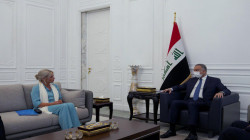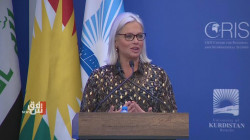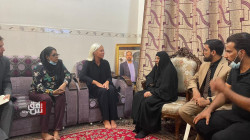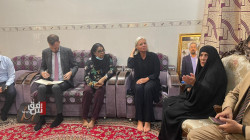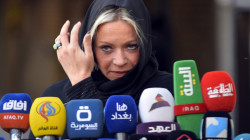Full text of the Briefing on Iraq to the Security Council by SRSG Hennis-Plasschaert
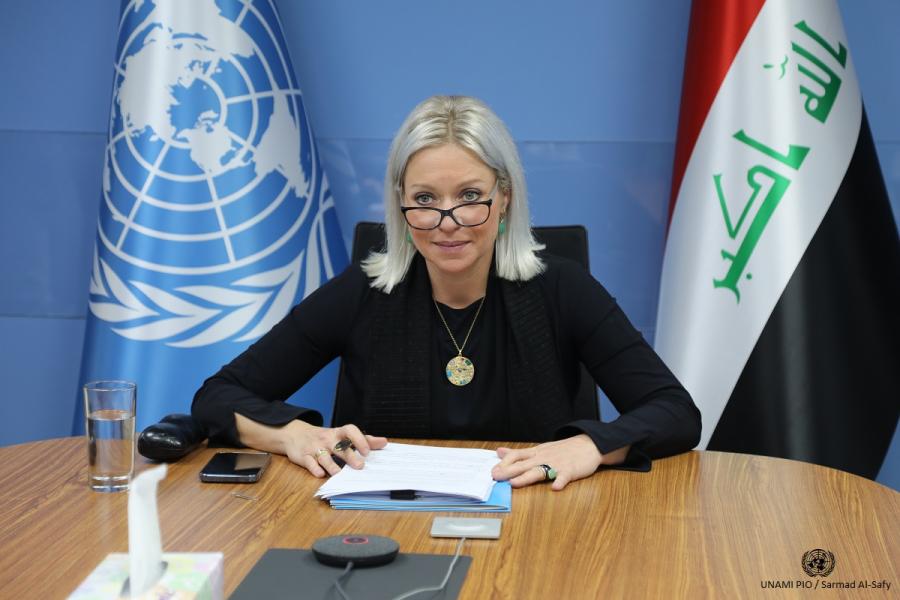
Shafaq News/ The United Nations (UN) Security Council held an open video-teleconference briefing on the situation in Iraq earlier today, Tuesday.
"The elections were assessed as generally peaceful, well run, featuring significant technical and procedural improvements. All in all, a substantial achievement - which Iraq’s authorities and parties would do well to publicly acknowledge," the Special Representative of the Secretary-General for the United Nations Assistance Mission for Iraq, Jeanine Hennis-Plasschaert, said in her briefing.
"Under no circumstances must terrorism, violence and/or any other unlawful acts be allowed to derail Iraq's democratic process. To ease tensions, calm, restraint and dialogue are the only way forward."
"Women candidates seem to have operated very successfully – thereby taking advantage of, and likely exceeding, the 25% women quota, which is a floor and not a ceiling."
"So far, and as stated by the Iraqi judiciary, there is no evidence of systemic fraud … any outstanding electoral concerns must only be dealt with through established legal channels, in accordance with the law."
"Results will only be final after ratification by the Federal Supreme Court, which takes place once the Electoral Judicial Panel has adjudicated on those appeals brought before it. Today I can only say that further patience will have to be exercised."
"Any unlawful attempts to prolong or discredit the electoral results process, or worse, to alter the electoral results through (for instance) intimidation and pressure, can only backfire. And I call on all stakeholders not to go down that path."
"While the risk of continued political deadlock is real, Iraq desperately needs a government that is able to -swiftly and effectively- tackle the long list of unfinished domestic business: this is the primary responsibility of all political stakeholders."
"Elections were hard earned, and importantly: technically well-managed. A process for which the Independent High Electoral Commission (IHEC) and others deserve credit. Indeed, the recent parliamentary elections can serve as an important steppingstone on a longer path towards regaining public trust."
Shafaq News Agency shares below the full text of Mrs. Hennis-Plasschaert's Briefing before the Security Council:
Mr. President,
Distinguished members of the Security Council
As much as I would have liked to be with you in the chamber today, with the 10 October elections just behind us, we judged it more efficient to address you from Baghdad. It goes without saying that I very much look forward to seeing you in person early next year.
Given the importance of the recent parliamentary elections, as well as the political and security developments since, today’s briefing will principally focus on the electoral and post-electoral environment.
Given the importance of the recent parliamentary elections, as well as the political and security developments since, today’s briefing will principally focus on the electoral and post-electoral environment.
At the outset, I do wish to make a resolutely positive observation: these were the fifth national elections held under Iraq’s 2005 constitution. And there is much for Iraqis to be proud of in this election.
As we have noted before: the elections were assessed as generally peaceful, well run, featuring significant technical and procedural improvements. All in all, a substantial achievement - which Iraq’s authorities and parties would do well to publicly acknowledge.
Also, and I cannot overstate, these elections were hard-earned. Let us not forget, the October-elections emerged from an unprecedented wave of country-wide demonstrations in 2019. Demonstrations that were marked by violence, excessive use of force, abductions and targeted killings. Demonstrations that resulted in hundreds of deaths and thousands of injuries.
Mr. President, there is no denying it: elections and their outcomes can provoke strong feelings. That goes for any democracy across the globe. And Iraq is no different. Depending on where one stands, emotions can run high.
Most of the time, these strong feelings will spark intense debate on, for instance, the direction the country should go in. And there is absolutely nothing wrong with that. Such debates are the bedrock of pluralism and demonstrate political engagement.
However, if such feelings and debates give way to undemocratic impulses - such as disinformation, baseless accusations, intimidation, threats of violence or worse - then sooner or later, the door is opened to acts that are simply intolerable.
Mr. President, on 17 October, parties rejecting the electoral results began demonstrations and sit-ins, which escalated on November 5, with casualties reported in Baghdad.
In the early hours of November 7, an assassination attempt on the Prime Minister took place. A direct attack on the State. A heinous act, and one which can only be condemned in the strongest of terms. Let me be clear: under no circumstances must terrorism, violence and/or any other unlawful acts be allowed to derail Iraq’s democratic process. To ease tensions, calm, restraint and dialogue are the only way forward.
The fact is that citizens in democracies often must recognize that, even if the results are not what she or he hoped for, the process as such might have been sound. In fact, one of the clearest signs of a strengthening democracy is the ability for parties and electors to recognize outcomes - no matter their individual preferences when it comes to results.
In the case of Iraq, the aggregated votes at the national level do not necessarily translate in the number of seats some parties might have expected. How so? Well, for instance, too many candidates in one constituency could have led to a fragmentation of votes.
Interesting in Iraq’s case is that women candidates seem to have operated very successfully – thereby taking advantage of, and likely exceeding, the 25% women quota, which is a floor and not a ceiling.
What I am saying is: while losing seats can be difficult to digest, it is important - for any party in any democracy - to examine the reasons and to learn for future elections.
For any other issues, including accusations of manipulation, the established legal channels are open. And in the case of Iraq: widely used. But so far, and as stated by the Iraqi judiciary, there is no evidence of systemic fraud.
Mr. President, in recent weeks, we have observed a severe lack of trust. A lack of trust between parties, between parties and institutions, between parties and authorities. And that’s not even mentioning the longstanding lack of public trust in both politicians and institutions.
Now, that is not without risk, as mistrust often leads to escalation.
Hence, our consistent calls for political dialogue to prevail. And again, any outstanding electoral concerns must only be dealt with through established legal channels, in accordance with the law. There is no point in using others as a scapegoat for electoral grievances.
Now, where do things stand as we speak?
Results will only be final after ratification by the Federal Supreme Court, which takes place once the Electoral Judicial Panel has adjudicated on those appeals brought before it.
Today I can only say that further patience will have to be exercised. The Electoral Judicial Panel is finalizing its work, and IHEC is conducting a further examination of over 800 polling stations based on the decisions issued by the Electoral Judicial Panel. Once this has been completed, IHEC is expected to send the final results to the Federal Supreme Court.
While it would be preferable to have the final results ratified sooner rather than later, it should be noted that there are no constitutional time limits for ratification by the Federal Supreme Court.
Having said this, let me emphasize: any unlawful attempts to prolong or discredit the electoral results process, or worse: to alter the electoral results through (for instance) intimidation and pressure, can only backfire. And I call on all stakeholders not to go down that path.
Mr. President, in the midst of this post-electoral turmoil, it is clear that Iraq cannot afford its national interest to be neglected. As I have noted before: elections are never an end, but rather a means. And while the risk of continued political deadlock is real, Iraq desperately needs a government that is able to - swiftly and effectively - tackle the long list of unfinished domestic business: this is the primary responsibility of all political stakeholders.
In other words: it is important for the current situation not to drag on. Statesmanship, leadership and sound judgement are needed, and it is all needed, and so is a broad commitment to political dialogue, with factual information as a basis for deliberations and decision-making.
Clearly, time is of the essence. As I stated in August, it is high time for Iraq to emerge from prolonged political standstill, and to establish dynamic, responsive governance mechanisms.
In fact, the current post-electoral phase is the moment for all political actors to demonstrate their determination in service of all Iraqis.
Yet again, I can only refer to the events that led to the October elections in the first place. A lack of political, economic and social prospects made many, many Iraqis take to the streets. Their demands and grievances remain as relevant as ever. And as we all know, simmering anger easily swells.
Plainly speaking, Iraq’s current outlook is precarious - to say the least. And in the absence of genuine reforms, the situation will not get any better. On the contrary.
Mr. President, some final notes on the issue of missing Kuwaiti, third-country nationals and missing Kuwaiti property, including the national archives:
On 18 November, Kuwait announced the identification of another 19 Kuwaiti Prisoners of War and missing persons, bringing the total number of Kuwaiti Missing persons and third country nationals identified to date to 59: 57 Kuwaitis and 2 Saudis.
This breakthrough was possible with concerted, persistent efforts in the past couple of years, combining two elements: witness information and satellite imagery.
Here I would like to emphasize the importance for the Government of Iraq not to lose this momentum, and to use these elements to locate the remaining 300 plus missing Kuwaitis and third country nationals. I am confident that the strong commitment of all actors could expedite the resolution of this humanitarian file.
I am also pleased to report that after considerable delays due to the covid 19 pandemic, on 18 November, UNAMI successfully completed the training of 20 Iraqi staff from the Ministry of Defence on the use of Ground Penetrating Radar, which could further contribute to locating human remains, in addition to witness information and satellite imagery.
Mr. President,
In closing, allow me to reiterate: the October elections were hard earned, and importantly: technically well-managed. A process for which IHEC and others deserve credit.
Indeed, the recent parliamentary elections can serve as an important steppingstone on a longer path towards regaining public trust.
And as we await the ratification of results by the Federal Supreme Court, I can only underline that what happens in the coming days and weeks will prove to be even more significant for Iraq’s immediate future.
The importance of a sound and inclusive government formation process cannot be overstated.
Thank you.
